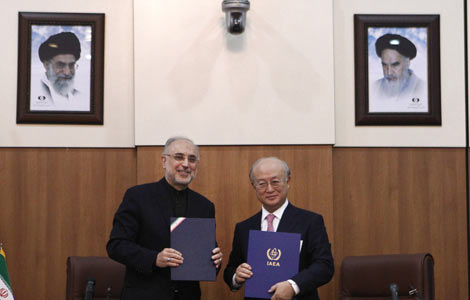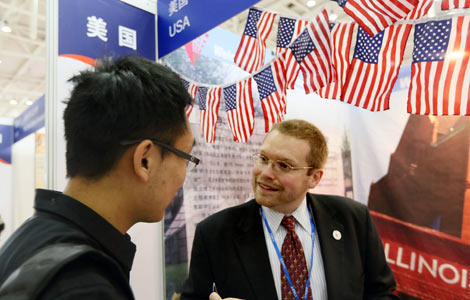Pols shift from anti-China message to target Asian voters
Updated: 2013-11-06 08:01
By Kelly Chung Dawson (China Daily USA)
|
||||||||
 Asian Americans are the fastest-growing ethnic group in the US, and some politicians are now scrambling to reconcile a need to appeal to that community with a lingering anti-China sentiment that reached a climax in the 2010 midterm elections.
Asian Americans are the fastest-growing ethnic group in the US, and some politicians are now scrambling to reconcile a need to appeal to that community with a lingering anti-China sentiment that reached a climax in the 2010 midterm elections.
In that year, at least 29 candidates ran advertisements featuring imagery and messages related to China's economic rise at the supposed expense of US jobs.
A TV spot for Democratic Senator Harry Reid of Nevada (the US Senate majority leader) accused Republican Sharron Angle of being "a foreign worker's best friend," against the backdrop of images of Chinese factory workers.
The most infamous ad that year featured a Chinese professor speaking in subtitled Mandarin to a classroom of the future, recounting America's downfall: "Of course, we owned most of their debt--- so now they work for us," the professor says to a room full of laughing Chinese students. Produced by Citizens Against Government Waste, the ad seized on the need for a scapegoat amidst a growing mood of economic discontent.
But in 2012, nearly 4 million Asian Americans voted in the general election, representing a 91 percent increase from 2000. According to a Pew study, Asian Americans have surpassed Hispanics as the largest group of new immigrants in the US. Politicians are now faced with the realization that Asian votes are increasingly important to their success, in an atmosphere that often still blames China for a lack of jobs.
The rise of Asian voters and an active social media culture have contributed to more nuanced attitudes toward the handling of foreign policy and race in politics, said Karthick Ramakrishnan, associate professor of political science at the University of California Riverside and the overseer of the National Asian-American Survey.
"There's a new norm today and a greater sensitivity toward not making connections between Asian Americans and foreign policy toward China," he said. "If something is clearly shown to be related to a foreign country, politicians can get away with more -- but if a link is made with people of that culture living in America, you're more likely to see push-back."
In 2010, Ohio US Democratic Representative Zack Space ran an ad in which he accused Republican rival Bob Gibbs of being a "free trader" who had contributed to 91,000 jobs lost from the state to China. The advertisement featured images of San Francisco's Chinatown, in an overt attempt to bring the threat closer to home. That type of ad would be less likely to run today, Ramakrishnan said.
Still, advertisements in this year's off-cycle election have included clumsy attempts to utilize Asian imagery for unclear purposes: In South Pasadena, California, City Council hopeful Philip Putnam ran print advertisements featuring an image of himself standing among rows of Terracotta Warrior statues under the slogan "Not Like the Rest of the Crowd." In a city where Asian voters comprise 35 percent of the population, the potential implication of his message is that his whiteness sets him apart.
In Virginia, where voters of Hispanic, black and Asian backgrounds helped win the state for President Barack Obama in 2008 and 2012, the Republican National Committee ran a 30-second advertisement on a Korean-language cable station last weekend accusing the Democratic gubernatorial candidate of having ties to a company that has secured financing through shady deals to get visas for investors.
"[Terry] McAuliffe's company is under federal investigation for potentially defrauding money from Asian investors," the advertisement claims. "We can't afford to have Terry McAuliffe's brand of crony politics in Richmond."
The advertisement is part of a $90,000 push to reach Asian-American voters across print, TV and radio in various Asian languages, according to the RNC.
Although 72 percent of Asian Americans voted for Obama in 2012, many Asian immigrants still retain conservative views toward business and social values. The move toward Democratic allegiance is a recent one: In 1992, 31 percent of Asian Americans voted for Bill Clinton; in 2000, the Asian-American vote was roughly evenly split between the candidates.
McAuliffe was running against Republican Ken Cuccinelli, a previously vocal anti-immigration hardliner who has toned down his rhetoric in the past year. The disconnect between what the RNC hopes to project and what individual Republican candidates actually represent has proved to be a problem, Ramakrishnan said.
But individuals on both sides of the aisle have made major missteps, including the controversy earlier this year in which pro-Democratic group Progress Kentucky pointed fingers at senator Mitch McConnell's Asian wife, former Secretary of Labor Elaine Chao, for supposedly persuading him to move American jobs to China.
US politicians have often played to anti-China sentiment to appeal to constituents. If Asian-American voters continue to grow in importance and numbers, politicians will likely have no choice but to respond by continuing the trend toward softened anti-China messaging with a greater focus on Asian-American voters.
Kdawson@chinadailyusa.com

 US honors its veterans with ceremonies, parades
US honors its veterans with ceremonies, parades
 Carnival season kicks off in Cologne
Carnival season kicks off in Cologne
 Typhoon Haiyan claims 6 in S. China
Typhoon Haiyan claims 6 in S. China
 Iran to give UN inspectors more access to nuclear sites
Iran to give UN inspectors more access to nuclear sites
 In love with Yunnan
In love with Yunnan
 Online shopping gala sets records
Online shopping gala sets records
 Report shows jump in Chinese students going to the US
Report shows jump in Chinese students going to the US
 2 killed in Texas party shooting
2 killed in Texas party shooting
Most Viewed
Editor's Picks

|

|

|

|

|

|
Today's Top News
Incubators, investors discussed in Los Angeles
3 jailed for life for Moscow airport bombing
ABC apologizes again for Kimmel 'joke' debacle
Sasser: 'Optimistic realist' on US-China ties
Global talent lacking in China
Journalists lead lonely-heart list
Iran to give UN inspectors more access
Reform to dominate talk at plenum
US Weekly

|

|





